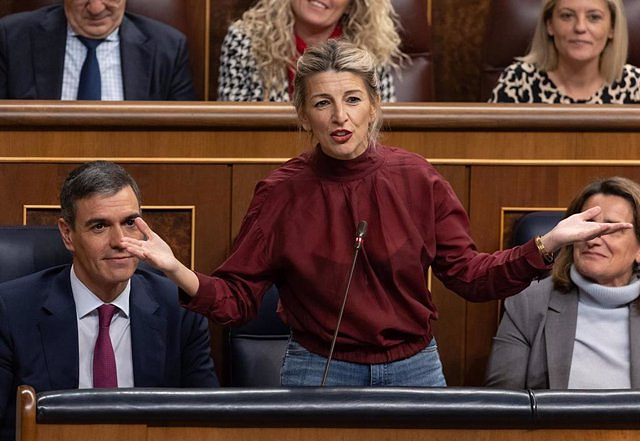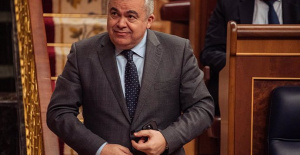He defends that Sumar has been key to maintaining measures in the extension of the anti-crisis decree, such as preserving aid for public transportation
The leader of Sumar and second vice president, Yolanda Díaz, has expressed her disagreement with the modification of the tax on energy companies so that strategic investments can be deducted, which she has called a "reduction" and "fiscal gift" for large companies in the sector.
This has been conveyed through a series of messages on the social network 'X', after the appearance of the President of the Government, Pedro Sánchez, after the Council of Ministers, where he explained that there will be changes in this tax that is extended, through the Budgets. , so that energy companies can deduct from January 1 strategic investments linked to industrial projects and the decarbonization of the productive system in the country.
"We do not share a tax reduction on the tax of large energy companies, when these companies have much greater profits in Spain than in the rest of Europe and people are having a bad time," said Díaz, who in previous days had demanded that this tax be maintained. as approved at the time.
Also through statements sent to the media, the leader of Sumar has explained that they reject making "tax gifts" to multinationals in the energy sector simply for meeting "the European minimums in terms of investment in a year in which they are having record profits."
What's more, he has insisted that he does not agree with the PSOE that "green and fair taxation is a problem for investment." In this regard, he has once again emphasized that Spain needs a "structural reform" in tax matters that is "fair" and guarantees that "those who earn the most, pay more."
Meanwhile, the deputy of Sumar and leader of Más País, Íñigo Errejón, has confirmed that the minority partner of the coalition maintains a "serious disagreement" with the PSOE, given that when the energy majors are multiplying profits "it is not the time to make them tax gifts".
On the other hand, Díaz has claimed that Sumar has managed to maintain the reduction of public transport in the anti-crisis decree, prohibit layoffs of working people and evictions of the vulnerable, as well as maintain taxes on banks and large fortunes.
And Sánchez has explained the extension of these two tax figures in the extraordinary benefits of both the financial and energy sectors for another year, although in the case of electricity companies he has clarified that there will be the change that Sumar disagrees with.
The second vice president has stressed that Sumar already made it clear that "it was not reasonable" to withdraw social protection measures when "the purchasing power of families has not yet been recovered."
"With this new package of measures we once again defend the purchasing power of households. We continue to contain prices and help families who cannot make ends meet, those who cannot pay and keep their home at an adequate temperature or "they cannot afford further increases in rent or mortgage," he concluded.
Errejón has also expressed satisfaction in Sumar for having managed to "move forward" in the coalition government the continuity of protection initiatives for working families.

 Exploring Cardano: Inner Workings and Advantages of this Cryptocurrency
Exploring Cardano: Inner Workings and Advantages of this Cryptocurrency Seville.- Economy.- Innova.- STSA inaugurates its new painting and sealing hangar in San Pablo, for 18 million
Seville.- Economy.- Innova.- STSA inaugurates its new painting and sealing hangar in San Pablo, for 18 million Innova.- More than 300 volunteers join the Andalucía Compromiso Digital network in one month to facilitate access to ICT
Innova.- More than 300 volunteers join the Andalucía Compromiso Digital network in one month to facilitate access to ICT Innova.-AMP.- Ayesa acquires 51% of Sadiel, which will create new technological engineering products and expand markets
Innova.-AMP.- Ayesa acquires 51% of Sadiel, which will create new technological engineering products and expand markets Khan is re-elected mayor of London and underpins Labor's victory in local elections
Khan is re-elected mayor of London and underpins Labor's victory in local elections Felipe VI swears the flag again 40 years later at the AGM with Princess Leonor as a witness
Felipe VI swears the flag again 40 years later at the AGM with Princess Leonor as a witness Freixenet and unions agree to reduce working hours by 20-50% this year due to the drought
Freixenet and unions agree to reduce working hours by 20-50% this year due to the drought STATEMENT: Nearly 400 people participate in the II Family Support Conference at UIC Barcelona
STATEMENT: Nearly 400 people participate in the II Family Support Conference at UIC Barcelona How Blockchain in being used to shape the future
How Blockchain in being used to shape the future Not just BTC and ETH: Here Are Some More Interesting Coins Worth Focusing on
Not just BTC and ETH: Here Are Some More Interesting Coins Worth Focusing on A sensor system obtains the fingerprint of essential oils and detects if they have been adulterated
A sensor system obtains the fingerprint of essential oils and detects if they have been adulterated Faraday UPV presents the 'Origin' rocket to exceed 10 km of flight: "It is the beginning of the journey to space"
Faraday UPV presents the 'Origin' rocket to exceed 10 km of flight: "It is the beginning of the journey to space" The Generalitat calls for aid worth 4 million to promote innovation projects in municipalities
The Generalitat calls for aid worth 4 million to promote innovation projects in municipalities UPV students design an app that helps improve the ventilation of homes in the face of high temperatures
UPV students design an app that helps improve the ventilation of homes in the face of high temperatures A million people demonstrate in France against Macron's pension reform
A million people demonstrate in France against Macron's pension reform Russia launches several missiles against "critical infrastructure" in the city of Zaporizhia
Russia launches several missiles against "critical infrastructure" in the city of Zaporizhia A "procession" remembers the dead of the Calabria shipwreck as bodies continue to wash up on the shore
A "procession" remembers the dead of the Calabria shipwreck as bodies continue to wash up on the shore Prison sentences handed down for three prominent Hong Kong pro-democracy activists
Prison sentences handed down for three prominent Hong Kong pro-democracy activists ETH continues to leave trading platforms, Ethereum balance on exchanges lowest in 3 years
ETH continues to leave trading platforms, Ethereum balance on exchanges lowest in 3 years Investors invest $450 million in Consensys, Ethereum incubator now valued at $7 billion
Investors invest $450 million in Consensys, Ethereum incubator now valued at $7 billion Alchemy Integrates Ethereum L2 Product Starknet to Enhance Web3 Scalability at a Price 100x Lower Than L1 Fees
Alchemy Integrates Ethereum L2 Product Starknet to Enhance Web3 Scalability at a Price 100x Lower Than L1 Fees Mining Report: Bitcoin's Electricity Consumption Declines by 25% in Q1 2022
Mining Report: Bitcoin's Electricity Consumption Declines by 25% in Q1 2022 Oil-to-Bitcoin Mining Firm Crusoe Energy Systems Raised $505 Million
Oil-to-Bitcoin Mining Firm Crusoe Energy Systems Raised $505 Million Microbt reveals the latest Bitcoin mining rigs -- Machines produce up to 126 TH/s with custom 5nm chip design
Microbt reveals the latest Bitcoin mining rigs -- Machines produce up to 126 TH/s with custom 5nm chip design Bitcoin's Mining Difficulty Hits a Lifetime High, With More Than 90% of BTC Supply Issued
Bitcoin's Mining Difficulty Hits a Lifetime High, With More Than 90% of BTC Supply Issued The Biggest Movers are Near, EOS, and RUNE during Friday's Selloff
The Biggest Movers are Near, EOS, and RUNE during Friday's Selloff Global Markets Spooked by a Hawkish Fed and Covid, Stocks and Crypto Gain After Musk Buys Twitter
Global Markets Spooked by a Hawkish Fed and Covid, Stocks and Crypto Gain After Musk Buys Twitter Bitso to offset carbon emissions from the Trading Platform's ERC20, ETH, and BTC Transactions
Bitso to offset carbon emissions from the Trading Platform's ERC20, ETH, and BTC Transactions Draftkings Announces 2022 College Hoops NFT Selection for March Madness
Draftkings Announces 2022 College Hoops NFT Selection for March Madness
























